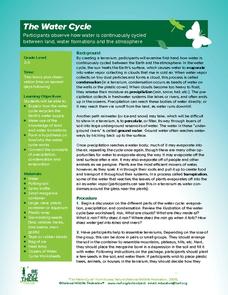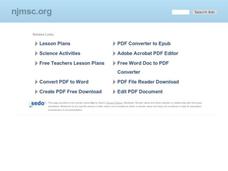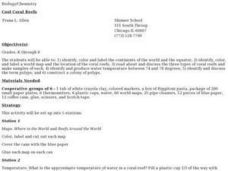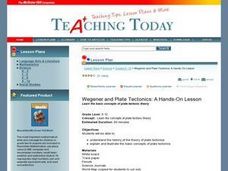Curated OER
The Water Cycle
Learners are introduced to the components and importance of the water cycle. They are shown how groundwater moves using a model. Students list 9 places on earth where water is found. They define the terms cycle and water cycle.
Curated OER
Dolphins
Students investigate dolphins. They complete a Webquest, explore various websites, listen to audio clips of dolphin sounds, play an online puzzle game, answer discussion questions, and read and evaluate newspaper articles about...
Curated OER
The Weight of Water
Students examine how salt water is more dense than fresh water. They discuss how manatees need to float and sink, conduct a sink or float experiment, and conduct an experiment with eggs and salt and fresh water.
Curated OER
Hermit Crabs Lifecycle & Stages
Students review the life cycle of land hermit crabs by viewing a poster or transparency. They identify the different body parts of a hermit crab and what each part is used for.
Curated OER
Ocean Animals - A Kindergarten Research Project
Something’s fishy! Assign each of your pupils an individual sea creature and investigate the oceans. Young oceanographers utilize Kidspiration software to research a creature, illustrate an image, and create fact cards about their...
Curated OER
7th Science Quiz
This seventh grade life science quiz has a professional appearance and well-written multiple-choice questions. However, it seems to cover too broad a variety of biology topics for only 15 questions to fully assess. There is one question...
Curated OER
An Imaginary Creature And Then Using Describing And Action Words for a Creative Writing Exercise
You have to collect lots of materials (boxes, bags, toilet paper rolls, etc.) for this lesson to work successfully. After modeling how to create an imaginary creature out of the collection of recycled materials, let your class search...
Curated OER
Teaching With Pourquoi Tales
Students read and discuss several Pourquoi tales--legends that explain why certain natural events occur. They complete a variety of activities surrounding each tale and then write their own Pourquoi tale.
Curated OER
Invent an Insect
Explore biology by researching adaptation. First, learners research and define a list of insect vocabulary terms and discuss the benefits of each insect characteristic. They then utilize a worksheet to create their own insect and share...
Curated OER
Corals & Coral Reefs
Students describe a coral reef, how it is formed and its inhabitants. They explain the ecological and economic importance of coral reefs and discuss its present-day threats. Lesson contains adaptations for all levels.
Curated OER
No Place Like Home?
Students investigate the impact of the physical environment on an endangered species. They create a plan for the ideal care of the species and develop an advertisement to promote awareness about the need for its protection.
Curated OER
Environmental Law
Students analyze the environmental impact of pollution. They demonstrate an understanding of law, punishment and enforcement. Applying their knowledge, they create their own anti-pollution laws.
Curated OER
Gardens Under the Sea: Coral Reefs
Students, with dive partners, explore coral reefs through scuba diving. They also explore radial symmetry and bilateral symmetry.
Curated OER
Pollutants on Coral
Students consider the effects of acid pollution on coral reefs. They brainstorm previous knowledge about coral reefs, examine a piece of coral and observe its reaction to acid and list ways we can prevent pollution from reaching the reefs.
Curated OER
Cool Coral Reefs
Students identify, color and label the continents of the world and the equator. They identify and produce water temperature between 74 and 78 degrees. They identify and discuss the term polyps and construct a colony of polyps.
Curated OER
Lesson 9 - Along Our Coast
Learners study the benefits of estuaries. They construct a saltwater food web, and complete worksheets and a quiz.
Curated OER
Wegener and Plate Tectonics: A Hands-On Lesson
Students are introduced to and experiment with the basic concepts of plate tectonic theory as well as assess the history of the theory of plate tectonics. They explain and illustrate the basic concepts through diagrams and models of...
Curated OER
How Does Your Magma Grow?
Students identify the three types of plate boundaries and the Earth's tectonic plates system. They examine how the Galapagos Islands were formed and hydrothermal vents.
Curated OER
Sports Challenge! Mr. D's Team
This PowerPoint provides a game board similar to Jeopardy filled with questions and answers related to science. The categories from which the teams choose are weather, water cycle, clouds, and space.
Curated OER
Corals and Coral Reefs
Students label the continents, oceans, and seas on a provided world map and use it to determine where they would expect most of the world's coral reefs to be found based on provided information the teacher has read to them.
Curated OER
WONDERFUL, WATERFUL WETLANDS
Students list characteristics of wetland and describe the functions of a wetland.
Curated OER
Small Wonders
Learners investigate some of the 'mysteries' of the animal, marine and insect worlds, and create student books explaining their findings to younger students.
Curated OER
Food Web
Students are able to define food web, and identify the interdependence of organisms within a system. They are able to describe how natural events and human activities can impact a food web.

























